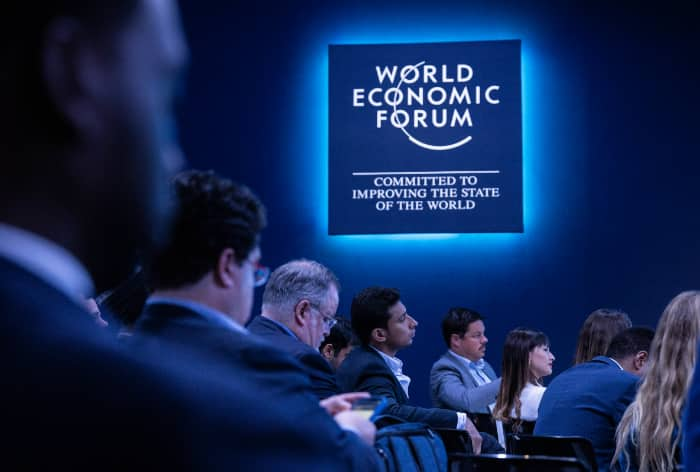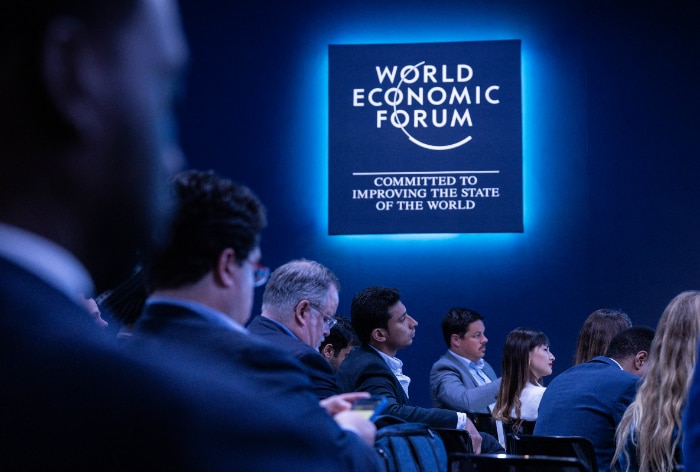. The summit is focusing on geopolitics, the future of AI, and climate change, with the motto of “rebuilding trust.”

The 2024 World Economic Forum has begun in Davos, Switzerland, the popular ski resort in the Swiss Alps, attracting public and private sector leaders from across the globe. The summit is focusing on geopolitics, the future of AI, and climate change, with the motto of “rebuilding trust.” Over 60 heads of state and government, including Antonio Guterres, UN Secretary-General, Ajay Banga, President of the World Bank Group, Tedros Adhanom Ghebreyesus, Director-General of the World Health Organisation, and political leaders from India, the US, China France and Sri Lanka, will be participating, along with more than 2,800 attendees from various sectors. The value of face-to-face conversations in addressing global issues is emphasized, especially in the context of the COVID-19 pandemic.
“Davos is easily mocked. But in current times it is hard to get people together to talk in a room on shared global issues and the value of face-to-face conversations is very real, as the COVID-19 pandemic showed,” Bronwen Maddox, director of the Chatham House think tank, was quoted as saying in an email by Livemint.
Who initiated the World Economic Forum?
Klaus Schwab, a German professor, founded the World Economic Forum (WEF). He had a background in mechanical engineering and later earned a Master of Public Administration degree from Harvard University. From 1972 to 2003, Schwab served as a professor of business policy at the University of Geneva, according to a report in The Indian Express.
Schwab established the WEF in 1971, originally known as the European Management Forum. One of the key concepts introduced by Schwab and the WEF is “stakeholder capitalism.”
The WEF website states that the idea behind stakeholder capitalism is that a company should serve all its stakeholders, not just its shareholders. It encourages businesses, government, and civil society leaders to come together to discuss global issues and brainstorm solutions to address these challenges.
What happens at WEF?
The annual summit in Davos provides a platform for leaders from various sectors to engage in discussions and find ways to tackle major global issues while considering the interests of all stakeholders and society as a whole. Here’s what typically happens at the WEF:
- 1. Participants: The meeting brings together around 3,000 participants, including paying members and selected invitees. These participants include investors, business leaders, political leaders, economists, celebrities, and journalists.
- 2. Global Issues: The WEF meeting focuses on a wide range of global issues, including economic, social, and environmental challenges. The discussions cover topics such as geopolitics, climate change, technology, healthcare, education, and more.
- 3. Sessions: The meeting consists of around 500 sessions, which are organized in different formats such as panel discussions, workshops, and presentations. These sessions provide a platform for participants to share their insights, exchange ideas, and collaborate on finding solutions to global challenges.
- 4. Stakeholder Engagement: The WEF emphasizes the importance of stakeholder engagement. It brings together representatives from business, government, civil society, and academia to ensure a diverse range of perspectives and expertise in addressing global issues.
- 5. Networking and Collaboration: The meeting provides ample opportunities for networking and collaboration among participants. It allows leaders from different sectors to connect, build relationships, and explore potential partnerships to drive positive change.
- 6. Side Events: In addition to the main sessions, the WEF meeting also includes various side events, such as exhibitions, cultural performances, and social gatherings. These events provide a platform for participants to engage in informal discussions and foster a sense of community.
Overall, the WEF meeting serves as a forum for stakeholders to come together, discuss global and regional socio-economic issues, and work towards finding innovative and sustainable solutions.
Who funds the WEF and why is the WEF Meeting held at Davos?
The World Economic Forum (WEF) is primarily funded by its partnering corporations, which are typically global enterprises with annual turnovers exceeding $5 billion. These corporations provide financial support to the WEF to facilitate its operations and initiatives.
As for why the WEF meeting is held in Davos, there are a few reasons. Firstly, Davos is a well-known and prestigious ski resort located in the Swiss Alps. It offers a serene and picturesque setting, which provides a conducive environment for focused discussions and networking among participants.
Secondly, the choice of Davos as the meeting location has historical significance. The setting of Thomas Mann’s novel “The Magic Mountain” is Davos. The novel tells the story of a young man who goes to Davos to stay at a sanatorium for three weeks but ends up spending seven years. This literary connection adds a cultural and symbolic element to the choice of Davos as the venue for the WEF meeting.
Lastly, holding the WEF meeting in Davos helps to create a sense of exclusivity and privacy. The remote location and limited access to the event contribute to a more intimate and confidential atmosphere, allowing participants to engage in open and candid discussions without the distractions of global politics.
Davos’ history
Davos has a rich history as a holiday destination, dating back 150 years, when the first winter guests arrived in 1865. Prior to that, it was primarily known as a summer mountain health resort for the treatment of tuberculosis patients.
In 1865, Doctor Friedrich Unger and Hugo Richter from Germany arrived in Davos for treatment. They used a makeshift bed made from a hay sled covered with boards. The treatment was successful, and both men were able to return to work. Unger eventually returned to Davos and worked as a doctor there for over two decades.
Richter, on the other hand, married a local woman and took over the management of a guest house. He later moved his publishing business to Davos and began printing two local newspapers.
Another notable figure associated with Davos is painter Ernst Ludwig Kirchner. He spent the last 20 years of his life in Davos and created many of his finest paintings there. His work can be seen throughout the town, and there is a museum dedicated to his art.
Towards the end of his life, Kirchner suffered a major nervous breakdown and spent his final days in a sanatorium in Davos. This sanatorium served as inspiration for Thomas Mann’s classic novel “The Magic Mountain”.
Davos’ connection with the World Economic Forum (WEF) began in 1971 when the Forum was known as the European Management Forum. That year, WEF founder Klaus Schwab invited over 400 European business leaders for a meeting at the Davos Congress Centre under the patronage of the European Commission. Since then, Davos has been the host city of the annual WEF meetings.
Overall, Davos has a fascinating history as both a healthcare resort and a cultural destination, with notable figures and events shaping its development over the years.

